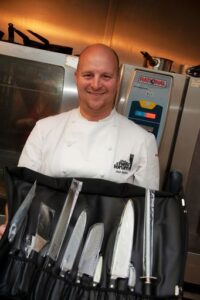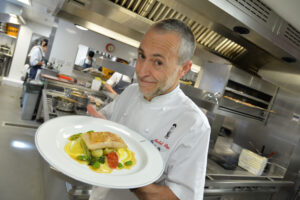A New Set of Knives from F.Dick is A Prize Worth Winning – Simply Fill Out the Rational Survey!
A new set of knives from F.Dick is a prize worth winning. Even more so when they come in a unique knife holder from Rational. All you have to do to enter the draw is fill out a survey about your business. Three knife sets will be given out in a beautiful Rational-branded knife roll worth £350!
 The survey is well worth doing for a very good reason; Technology has changed cooking for the better. It is possible now to run a kitchen with two, central, pieces of equipment – a Rational iCombi and a Rational iVario multifunctional cooking system. With the ability to micromanage a heatable surface into 4 zones the days of the range and umpteen pans that need washing may be drawing to a close.
The survey is well worth doing for a very good reason; Technology has changed cooking for the better. It is possible now to run a kitchen with two, central, pieces of equipment – a Rational iCombi and a Rational iVario multifunctional cooking system. With the ability to micromanage a heatable surface into 4 zones the days of the range and umpteen pans that need washing may be drawing to a close.
This may be a vision of the future, but it also makes perfect sense. The iVario multifunctional cooking system is now a stockpot, a pressure cooker and a plancha all in one. Technology is not de-skilling the kitchen like it was once feared. Instead, world-leading technology is liberating chefs to become more creative because consistency is at its core.
 Many kitchens find that their combi is indispensable. It can work all night, switch itself on and off and prove and bake bread ready for the morning. And this is the reason that Rational want to know more about your business. They are working with The Chefs’ Forum to understand how you are operating and what type of business you are in – whether it’s pub, hospital, care home, hotel, supermarket, convenience store or cafe/coffee shop.
Many kitchens find that their combi is indispensable. It can work all night, switch itself on and off and prove and bake bread ready for the morning. And this is the reason that Rational want to know more about your business. They are working with The Chefs’ Forum to understand how you are operating and what type of business you are in – whether it’s pub, hospital, care home, hotel, supermarket, convenience store or cafe/coffee shop.
 This information will enable Rational to build the next generation of technology to make your kitchen even more efficient. So, complete the survey, contribute to Rational’s innovation strategy and put yourself in a position to win a set of knives and look forward to a bright future.
This information will enable Rational to build the next generation of technology to make your kitchen even more efficient. So, complete the survey, contribute to Rational’s innovation strategy and put yourself in a position to win a set of knives and look forward to a bright future.
As you will have noticed, The Chefs’ Forum has been working closely with Rational to keep you updated with the latest information on new products and equipment ranges. There is also a fantastic webinar facility for you to find out all about the cutting-edge features and functionality of the new iCombi and iVario ranges.
Previous winners of Chefs’ Forum competitions showcasing Rational have nothing but praise for the leading combi oven manufacturer. They have hugely benefitted from winning a fantastic F.Dick knife roll worth £350.
Here’s what they had to say about it:
 “My F.Dick Rational knives go everywhere with me, they are the best set of knives I’ve had.
“My F.Dick Rational knives go everywhere with me, they are the best set of knives I’ve had.
I was stoked to win the competition – Huge thanks to The Chefs’ Forum and Rational. Rational is an integral part of my kitchen and I wouldn’t use anything else!”
Andy Chan, Head Chef, Luxury Family Hotels
 “I was delighted to win a set of F.Dick knives, they are very comfortable, excellent sharpness, they keep the edge very well – There’s a knife for every task in the kit.”
“I was delighted to win a set of F.Dick knives, they are very comfortable, excellent sharpness, they keep the edge very well – There’s a knife for every task in the kit.”
“I have used Rational for all my career as a chef spanning 26 years. Their equipment is the best in the industry and seems to just get better and better as the technology advances. We would love a new iVario Pro for the college kitchen to show how many pieces of kitchen equipment can be amalgamated into one machine.
My oldest Rational in the college kitchen is 25 years old, practically an antique and still works perfectly.”
Gavin George , Course Lead Chef Lecturer, Coleg Gwent
 “Rational are hands-down the best combi ovens. It’s great to see the new iCombi range and the webinars showcasing the latest innovations.”
“Rational are hands-down the best combi ovens. It’s great to see the new iCombi range and the webinars showcasing the latest innovations.”
“My F.Dick knives won in the last Rational competition have proved invaluable. I really enjoy working with them – A truly great prize!”
Matt Budden, Executive Chef, Hilton, Bournemouth
The Chefs’ Forum would like to thank you all for taking part in the survey and wish you the very best of luck in winning this Rational-branded F.Dick knife roll!
CLICK HERE TO TAKE THE SURVEY
The Michelin-starred Vegetarian Scotch Egg: A Thing of Beauty!
Chefs are often at the very forefront of innovation but sometimes that creativity and imagination can push boundaries in completely new ways.
Take the recent dish idea from Sally Abé at The Harwood Arms which has a Michelin star. She wanted to make a new version of her popular Scotch Egg which has a loyal following and cannot be removed from the menu.
However, the aim of the new egg was to make something vegetarian. That got her thinking. The idea she came up with was to use a classic recipe for a Glamorgan sausage which contains cheese and leeks. But, she found she needed something extra to give it a kick.
To do this she turned to a vegan bacon by This! This! Make a plant-based bacon and plant-based chicken and have been incredibly successful. By adding This! Bacon to her Scotch Egg she achieved a first.
No other Michelin star chef has dipped their toes into the plant-based alternative market but it is easy to see that she won’t be the last. Here’s what she said on Instagram when she announced the new dish:
“Our very first vegetarian Scotch egg, based on a Glamorgan sausage with Caerphilly cheese, leeks, potato and @this.uk vegan bacon giving it a lovely smokey note. A real rival to the original!”
This dish brings up an important point about what chefs do: there are no boundaries. The job of a chef is to feed people and if you are able to do this in a way that utilises current ingredients and allows customers to taste new things in a fresh way then that has to be applauded.
By using a plant-based bacon Sally Abé has opened up the flavour of bacon to a group of diners who would never order something like that on a menu. What she has achieved by thinking out of the box is that what is important in her vegetarian Scotch Egg is the flavour and crunch of bacon – not the bacon itself. That is a major breakthrough and it takes a chef of considerable courage to have an idea like that and the imagination to see how to do it.
It also leads to other questions such as how long will it be before a chicken casserole on a menu does not contain chicken but instead contains a plant-based alternative? The blurring of vegan, vegetarian and mainstream is now a fully-fledged trend and chefs need to accept that there are new ways to achieve old dishes and new customers waiting to try them.
Kol Brings Mexican Gastronomy to London!
In terms of sheer variety catering college graduates have a world of choice available to them when they decide their first steps. There are always new restaurants opening and every so often one or two open that just seem to tick every box.
One of these is new restaurant Kol in London. If you know anything about modern restaurants you will be very interested in Kol as it has serious pedigree. The chef is Santiago Lastra from Mexico who has worked with some of world’s greatest chefs including Andoni Luis Aduriz of Mugaritz in Spain and René Redzepi of Noma in Denmark.
Kol, which is Spanish for cabbage, is a rarity. According to Lastra there are only a few examples of authentic Mexican cuisine in the world. Too many Mexican-themed restaurants overlook the real, hidden, beauty that makes the food so special.
 “The name comes from the idea that you can take something very simple and make it very special if you want to,” Lastra told GQ Magazine. “And the menu will seem like traditional Mexican food, but will be much more refined and will always use British produce. For example, we use roasted gooseberries to create tomatillos; pistachios become our guacamole. The only things we are bringing in from outside the UK are dried chillies and corn.”
“The name comes from the idea that you can take something very simple and make it very special if you want to,” Lastra told GQ Magazine. “And the menu will seem like traditional Mexican food, but will be much more refined and will always use British produce. For example, we use roasted gooseberries to create tomatillos; pistachios become our guacamole. The only things we are bringing in from outside the UK are dried chillies and corn.”
The menu is fascinating. You’ll find a seaweed, chilli and mezcal broth alongside a confit of pork cheek with cabbage leaves, gooseberry and pear salsa and black beans. There’s also a squash sorbet.
The reason to get excited?
Very occasionally a chef breaks new grounds and introduces a cuisine that is unlike anything that has ben seen before. Kol is one of those. Even if you just go for a meal the experience will be memorable. If you decide to pluck up the courage and ask to do a stage you will be rewarded with something that could kickstart your food journey.
Back to the Old School – The Classics Return!
At the end of the 1980’s and the beginning of the 1990’s the classic French restaurant was coming to its end. British was in. France was out. Next came the molecular revolution from Spain and El Bulli followed by Heston Blumenthal and The Fat Duck. Everywhere chefs were reinventing what dining out was. This has continued with the long run of tasting menus and smaller portions.
 But, as is so often the case, gone does not mean forgotten and a new restaurant that has opened-up in London – Maison François – is showing that there is more than just a love of old-school French classicism. Indeed, this new place revels in the deliciousness of what once was.
But, as is so often the case, gone does not mean forgotten and a new restaurant that has opened-up in London – Maison François – is showing that there is more than just a love of old-school French classicism. Indeed, this new place revels in the deliciousness of what once was.
François O’Neill the man behind it has roots in the industry – his father co-founded Brasserie St. Quentin in the 1980s. He’s teamed up with Ed Wyand of Hackney wine bar Verden and chef Matthew Ryle who reached the final of Masterchef: The Professionals in 2018.
Why is this such a big deal for chef students?
 Because the foundation of classic cuisine is still the best model for learning that there is and if there is a movement back towards the great dishes of the past then that is good news for young chefs. It means there is a place they can go to train in this style.
Because the foundation of classic cuisine is still the best model for learning that there is and if there is a movement back towards the great dishes of the past then that is good news for young chefs. It means there is a place they can go to train in this style.
One of the dishes on the menu is Ouef en Gelée. Literally, a soft-boiled egg suspended in a meaty jelly. This dish was a classic of the old Connaught Hotel menu when it was under the auspices of French chef Michel Bourdin and dates back to the grand old man of classical cooking: Auguste Escoffier.
This style of food was considered not just old but dead. The use of a savory jelly was completely out of date according to the hip chefs of the day. But, and here’s the point, that opinion did not take into account that it was, actually, delicious – and a triumph of individual chef skill.
 One of the other things to return to the menu is a three-tier dessert trolley showcasing eclairs, fruit tarts and all the other yummy puddings of yesteryear. Maison Francais is a classic example of a restaurant that is returning to the past in order to reinvent the future. They are baking their own bread, making charcuterie and doing all the things that the old restaurants used to do and it is wonderful to see!
One of the other things to return to the menu is a three-tier dessert trolley showcasing eclairs, fruit tarts and all the other yummy puddings of yesteryear. Maison Francais is a classic example of a restaurant that is returning to the past in order to reinvent the future. They are baking their own bread, making charcuterie and doing all the things that the old restaurants used to do and it is wonderful to see!
Hayden Groves to Join Chefs’ Forum Academy
We are pleased to welcome former National Chef of the Year Hayden Groves to the growing roster of chefs who are providing inspiration and education to our Chefs’ Academy.
“We’re really delighted that Hayden is joining us,” said Catherine Farinha. “Not only is he a former winner of the National Chef of the Year but he is a highly experienced chef who has worked at the very top of the industry for many years.
“He will be bringing that experience to The Chefs’ Forum in a number of ways. He will be doing live calls with students, recipe films and creating eye-catching recipe cards for students to add to their portfolios.”
Hayden, who was until recently Executive Chef of leading caterer Baxter Storey, told The Chefs’ Forum:
“I’m excited to be able to pass on some of my experience to the next generation. I’ve had a very interesting career the latter part of it spent in private dining in the City of London. This is an excellent place to work if you want to learn good cooking in a small, intimate kitchen that covers many disciplines.
“My advice for young chefs looking at the industry is that the harder you work the luckier you become. So, work hard right from college onwards. I’ve always used the analogy of two eyes, two ears and one mouth.
“Do a lot of watching, a lot of listening and ask the right questions. Think about what you want to achieve and don’t always think you have to do fine dining. Baxter Storey, for example, are an excellent company that produce food of the highest quality across many sectors. As a young chef you have the choice of where you go on to work – always choose a kitchen where they have your best interests at heart.”
Denise Charles, Head of Curriculum for Service Industries at West London College concluded
“Hayden joining The Chefs’ Forum Academy at West London College is excellent news for our students and a fantastic opportunity for them to work with a leading chef in these difficult times. Due to Covid restrictions, it is unlikely that the students will be able to participate in work experience off campus this year. The Chefs’ Forum Academy sessions will count as part of their thirty-five hours of work experience required to pass their course and they can achieve this valuable employer engagement in their usual learning environment, adhering to college Covid-safe protocol.”
 For students who are interested Hayden has a number of copies of his recent book, Back in the Saddle, available for Chefs’ Forum members. All of which will be signed and personalised.
For students who are interested Hayden has a number of copies of his recent book, Back in the Saddle, available for Chefs’ Forum members. All of which will be signed and personalised.
Back in the Saddle
In 2017, a team of amateur cyclists took on the 3 Tours Challenge, riding the Giro d’Italia, the Tour de France and the Vuelta a España to help raise vital money for blood cancer charity Cure Leukaemia.

 The challenge was to cycle over 10403km in just 63 days, completing each of the famous Grand Tours one day ahead of the professionals – a feat only 39 professional cyclists have ever completed.
The challenge was to cycle over 10403km in just 63 days, completing each of the famous Grand Tours one day ahead of the professionals – a feat only 39 professional cyclists have ever completed.
The team of riders included Geoff Thomas, former England and Crystal Palace footballer; James Maltin, wealth manager; Doug McKinnon, telecoms entrepreneur, and Hayden Groves, chef and author of Back in the Saddle.
Back in the Saddle features 63 recipes inspired by every stage of their route through Italy, France and Spain: a cycling and food odyssey.
The book features contributions from Professor Charles Craddock CBE, Alastair Storey, Phil Liggett MBE, Laura Kenny CBE and Michel Roux Jr.
 Hayden said:
Hayden said:
“I have 80 copies for The Chefs’ Forum members I am signing and personalising for a special price of £25 + P&P (the sale of which will continue to go to Cure Leukaemia)” click here to order.
Sous Vide Sales Soar as Social Distance Regulations Impact Kitchens
It’s the pristine, natural environment of New Zealand that gives Alliance Group NZ’s Pure South lamb and venison its unique taste and flavour. Surrounded by ocean, sustainable natural resources and a temperate climate, New Zealand is the perfect place to raise premium livestock, which is why it sells so well, but now social distance regulations are providing a new reason.
Alliance Group NZ, a NZ$1.53 billion global food business and New Zealand’s largest farming co-operative reports a 50% spike in demand for its prepared Pure South venison rack and lamb products cooked in the sous vide method. It believes this is partly due to new social distance regulations.
Since sharing availability about its sous vide range, Alliance has seen enquires up 50% from June to July compared with last year with interest received in the UK and from Europe, as a result of chefs discovering how easy the product can be prepared with reduced kitchen brigades. As a socially distanced ready product, the Pure South sous vide range reduces labour requirements, helping operators to meet new social distancing regulations easily and without any reduction in the quality of meal they can produce.
Sous vide is a superb method to control and deliver precision cooking. The technique results in uniformly excellent food which is protected from shrinkage. Chefs can finish the meat to precise customer taste, which includes offering a range of finishes such as medium rare or well done. Prepared sous vide is the ultimate convenient chef solution.
The prepared range has been slow cooked in a sealed pouch within a water bath for between four to eight hours and monitored to ensure professional consistency every time. The naturally slow cooking process also locks in moisture for an enhanced flavour profile.
All products are fully cooked and ready to heat and finalise in the kitchen, as products are individually portioned this also helps reduce waste. The result is a flavoursome, fork-tender meat, making it easy to see why it has won so many awards.
Donna Smith, Regional General Manager UK and Europe for Alliance comments; “The challenge for pubs and restaurants is far from over, but they still want the ability to provide their guests with a high-quality food experience. Our pre-prepared sous vide range has taken a large amount of time out of the cooking process, which means it needs less chefs to prepare it ready for service. As an individually packaged product, there is also less wastage as chefs only use what they need and can be assured of longevity should any future closures be on the horizon.”
In total there are nine flavoursome sous vide lamb and venison products in the Pure South range, with cuts including lamb henry, loin, shoulder rack, lamb fore and hind shank, lamb ribs, pulled lamb, lamb rump and venison rack.
All products are lightly seasoned in salt and black pepper, while the lamb fore shank is additionally pre-seasoned in garlic, black pepper and rosemary before being cooked sous vide.
The lamb ribs, rump and loin are lightly seasoned and naturally oak smoked before being cooked sous vide for a delicious flavour. And the pulled lamb is seasoned with paprika, cayenne, coriander, cumin and crushed chillies before being slow cooked. All of the products can be made bespoke, with alternative seasonings added.
Alliance’s lamb and venison is grass-fed, free range and GMO-free. None of the lamb or venison in the prepared sous vide range uses any preservatives to extend shelf life and has undergone minimal processing.
The sous vide range is available immediately in the UK and is delivered frozen.
Le Gavroche Opening an Hour Earlier Makes Perfect Business Sense
Michel Roux Jnr has taken the decision to open Le Gavroche an hour earlier at 5pm. On Twitter he made a couple of tongue-in-cheek jokes about it but the choice is based on sound business principles – something that the Roux family as a whole are famous for.
One of the jokes was this: “In a couple of weeks it’s going to be dark at 4pm… so dinner at 5pm makes sense followed by a little nightcap at 7pm and off to bed…”
Very witty. But, dig a little deeper and the decision makes complete sense. What Le Gavroche are doing is giving themselves a chance to be open for longer. Though there are no theatres open for pre-theatre the opportunity to go to Le Gavroche for an early dinner is a option. And it gives the restaurant an option to turn over tables rather than running out of time with diners who start at 6.30 or 7.00.
 Le Gavroche has a history of knowing just what to offer customers in times of crisis. Famously, during the Gulf War in 1990-1991 and the restaurant recession that followed Le Gavroche did not reduce its prices, like many other restaurants at that time. What they did instead was to increase the portion sizes slightly so that their customers felt they were getting extra value.
Le Gavroche has a history of knowing just what to offer customers in times of crisis. Famously, during the Gulf War in 1990-1991 and the restaurant recession that followed Le Gavroche did not reduce its prices, like many other restaurants at that time. What they did instead was to increase the portion sizes slightly so that their customers felt they were getting extra value.
This understanding of how customers feel about their food and surroundings is all part of the Roux legacy founded by Albert (Michel Jnr’s father) and Michel (uncle). They had both worked in private service in country houses and had a unique understanding in how society worked.
They brought that knowledge and their unquestioned gastronomic skill to first Le Gavroche and then The Waterside Inn. Both restaurants are still going strongly today because they are built on fundamental principles – like understanding that opening at 5pm is good for business.
If you want to learn about the restaurant trade then a stint in the kitchens at Le Gavroche is going to teach you some very important lessons.
Is TripAdvisor Every Chef’s Dream or Nightmare?
It holds out so much promise on one hand – genuine feedback from real customers – but can also deliver devastation with the other: cruel, deliberate, reviews aimed at hurting a business or a chef.
The Chefs’ Forum takes a look at a recent example of a spiteful review and asks the important question: what do you do when this happens to you?
 The example in question is a review of Sticky Walnut in Chester run by formidable chef Gary Usher. He is rarely tempted to get personally involved with a review, as he says, but in this case found himself unable to resist.
The example in question is a review of Sticky Walnut in Chester run by formidable chef Gary Usher. He is rarely tempted to get personally involved with a review, as he says, but in this case found himself unable to resist.
Reviewer emalinaker wrote, following a visit to Sticky Walnut, recently:
“If you want to pay 45 POUNDS each for an average piece of sirloin steak and some Parmesan chips then this is the place to go! A really misleading menu along with EYE WATERINGLY expensive steak which is NOT worth it. When we mentioned to the waitress we thought the menu was misleading instead of apologising and trying to fix our dishes she got extremely agitated, defensive and frankly rude. Sticky Walnut was somewhere I used to look foreword to but I would council (sic) EVERYONE heading to Chester for a decent meal to avoid this place like the plague unless they like being ripped off.”
On Tripadvisor Usher replied personally barely able to restrain his fury:
Good morning Emma
I only personally respond on here every few years so well done getting me out of Twit-advisor hibernation.
The essence of your “review” should be quite simple. You think we’re a rip off which is probably the most common complaint across the whole of the Twit-advisor website. So nothing new there. So why am I responding? Simply because you wouldn’t allow Becky the MANAGER to explain at the time. In fact it was YOU who got extremely agitated, defensive and quite frankly rude.
The menu is set at a fixed price of £39 for 3 courses. With all set menus there are supplements. On ours it’s our dry aged Aubrey Allen sirloin. In Sticky Walnut it will cost an extra £15 per person to have the sirloin instead of, for example, the feather blade of beef. Your last Twit-advisor review was for The Dorchester “to celebrate Mummy’s birthday”. Their menu is £53 for 3 courses, also with a supplement for the sharing beef of £22 per person. Ironically we use the same butcher. Why Emma did you not complain about your bill there not take a photo of your receipt? Going by your review I’ve calculated that you spent over £500 for four guests which included a bottle of Chapel Down Rose Brut at £87. It’s available at Waitrose for £26. However you gave them a glowing 5 star review.
Whilst your online presence is a display of your love of luxury we are a humble neighbourhood bistro, serving the best produce we can source, served by fantastic teams, whilst trying to survive a global pandemic. You are a self-professed expert in comms and brand awareness and still manage to be so short sighted not to see how devastating your words can be. “Avoid this place like the plague” really Emma? My COUNSEL to you in this recession we find ourselves in is to think before you write.
Be kind. It won’t cost you as much as a first class flight to Dubai.
Gazza.
Brand ambassador & comms
What’s interesting about Gary’s response is how restrained he actually is. This comes from years of dealing with the same problem. His twitter feed is filled with run-ins he has had in the past.
The review was unjust in that the writer did not isolate a problem in a rational and considerate way but used offensive and ill-considered language designed to hurt those that she was writing about.
But this doesn’t answer the question. Was Gary Usher right to respond? Chefs may come across as bullish and opinionated in the media but anyone that knows them personally knows that underneath the bluster they are generous, considerate and kind.
Gary Usher is trying to run a business. He explains what happened in a humble way. He doesn’t reposed “like with like”. He urges kindness. The story was picked up by The Daily Mail. Now, a huge amount of the restaurant-going public can see how polite he was and also see how cruel the review was. This is what you must weigh up when responding to a bad review. Don’t fall into the trap of being rude back.
We think Gary Usher made the right choice.
West London College Implements Virtual Chefs’ Forum Academy Sessions for the New Academic Year!
Now in its second year, The Chefs’ Forum Academy at West London College is going from strength to strength. Current restrictions on chefs coming into the college mean that The Chefs’ Forum film crew are visiting chefs in their kitchens to film their recipes, so students still get the curriculum sessions that make West London College the number one choice in the Capital for budding young chefs and hospitality professionals.
Due to Covid-19 limitations, the chefs are unable to come into the college and teach the students in person as they normally would as part of The Chefs’ Forum Academy project. Instead, the chefs have created a fascinating film of their recipe to be shown to the students in a Zoom call with a recipe card to accompany.
The chefs join the session via a live video link to host a question and answers session with the students where they will be able to quiz the chef on their career, the recipe that has been shown to them and general insight into the industry. The chefs also give live feedback on the students’ individual versions of the dishes they have created in the film.
This new way of learning sets out to maintain employer engagement and curriculum enrichment while restrictions remain in place. Once these are lifted, the students can look forward to different chefs and industry experts coming into the college on a weekly basis to teach them in their usual learning environment.
The weekly Chefs’ Forum Academy masterclasses involve various local chefs and front of house professionals from across London, coming into the college to give a compelling and inspirational course of study throughout the academic year, culminating in work experience opportunities at the participating properties and businesses once students are permitted to participate in such activities again.
The teaching team at the college are delighted to welcome the guest chefs into the college to enrich students’ learning.
 Denise Charles, Head of Curriculum – Service Industries at West London College said
Denise Charles, Head of Curriculum – Service Industries at West London College said
“I coordinate The Chefs’ Forum Academy sessions at the college and it’s great that we’ve been able to adapt the way we deliver masterclasses to adhere to current Covid-19 restrictions. We have had to find new ways to deliver our curriculum enrichment sessions to ensure our students are benefitting from the best learning experience possible, despite the limitations of social distancing which are beyond our control. We have been so impressed with the way in which our teaching chefs have all rallied together to make this work for our students and The Chefs’ Forum Academy. It just goes to show that they really prioritise inspiring the next generation and the future of our industry.”
The Chefs’ Forum Academy benefits the college, the students, and local employers. It is these relationships that will flourish to galvanise and support the future stars of our hospitality industry – A truly positive step in the right direction in such uncertain times.
Dipna Anand, Chef Proprietor at Brilliant Restaurant in Southall was first to deliver a masterclass earlier this week. Dipna is no stranger to online masterclasses and runs a very popular YouTube channel.
Dipna has been a regular guest lecturer at the college since the launch of The Chefs’ Forum Academy at West London College in 2018. Dipna really enjoys working with young people to showcase Indian cuisine and her love of the industry.
Brilliant Restaurant was voted Britain’s Best Family Run Restaurant in ITV’s first Food & Drinks Awards, so it is great for the students to meet such an esteemed chef. Dipna is a great role model for girls looking to join the industry that has been traditionally more male dominated. Dipna is about to appear on BB2’S Mary Berry’s Simple Comforts at 8pm on 30th September in the run-up to celebrating Diwali and she will also be making a string of other TV appearances in the coming weeks!
 Dipna said
Dipna said
“These Academy sessions give me the opportunity to engage with the next generation and identify new talent for my kitchen. I love to see the students enjoying cooking my recipes and its great to be able to give back to the industry in this way. I look forward to welcoming Denise and her students over to my restaurant for a show-round once restrictions are lifted.”
Next on the agenda is a masterclass from Darren Taylor, Executive Chef at a Premier League Football club in London. Not only will this showcase a different take on a career as a chef in the industry within a leading football club, but the variety of roles and settings in which to work once students qualify.
All chefs taking part wholeheartedly support The Chefs’ Forum Academy and are looking forward to working with students at West London College as part of The Chefs’ Forum Academy scheme of learning. Other chefs already signed-up to the scheme, creating compelling and inspirational masterclass films and recipe cards to accompany include Tom Booton (The Dorchester), Dominic Teague (One Aldwych), Chanaka Fernado (Buddha Bar), Gurpreet Dham (The Royal Lancaster), Charlie Taylor (The Westbury), Peter Fiori (Coutts), Daniel Pearse (The Savoy) and Michael Dutnall (RAF Club) – This list is set to grow considerably as more chefs are allocated teaching dates and confirm their availability.
In normal times, the chefs would come to the college each week and take a three-hour master class to enrich the learning of the students in line with the subjects they are required to learn to achieve their qualification. West London College is the only college in London to be working with The Chefs’ Forum Academy and this makes it an attractive choice for any young person wanting to learn from the very best chefs in the industry.
At the same time as learning new skills, cooking techniques and recipes, the students are forging relationships with the visiting chefs which will help them in their efforts to find work on leaving college as the chefs will already be familiar to them. Many learners get offered part time work whilst still in college – This served to make them more work-ready and enables them to get work experience whilst studying – A win-win situation for all involved.
The Chefs’ Forum Academy also operates in The Manchester College, Bath College, Pembrokeshire College and Coleg Gwent with further colleges set to adopt this fantastic programme of curriculum enrichment later this year. The Chefs’ Forum serves to bridge the gap between education and industry, inspiring young chefs, and front-of-house professionals.
The Chefs’ Forum would like to invite Executive, Head and Pastry Chefs who would like to know more about the project to get in touch. Any London hospitality employers interested in supporting the college and offering their expertise in teaching as part of The Chefs’ Forum Academy should email: rebecca@redcherry.uk.com
The Chefs’ Forum Academy Returns to The Manchester College
Students at The Manchester College Industry Excellence Academy for Hospitality & Catering enjoyed their first Chefs’ Forum Academy session of the year.
Level 2 Culinary Skills students took part in a masterclass with Duncan Dickinson, Head Chef and Managing Director at Herb and Spice Catering.
Duncan challenged the students to make a dish of roasted duck breast with blackberry and plum compote, served with creamed potatoes and spinach. After watching Duncan’s live demonstration, the students produced impressive results under his watchful eye.
“It was a nice little challenge and they’ve done really well,” Duncan said. “I enjoyed it and I was very impressed with them. All of their dishes looked really good and everybody added their own different spin on it.”
Duncan also took part in a Q+A with the students, who quizzed him on his career and how to have a successful and rewarding career in the industry.
Student Zac Penfold said: “I found today very interesting. I don’t cook with duck often, so it was eye-opening to try new things. I’ve really enjoyed the Chefs’ Forum Academy and learning from lots of different chefs. I’m looking forward to doing more of it.
“My course is helping me to work more efficiently in the kitchen and improve my knife skills. My tutor, Andrew, has also helped me with employability skills.”
“Next year I hope to progress to Level 3 at Openshaw and in the future, I hope to get a job at restaurant in Manchester city centre.”
The Manchester College’s partnership with The Chefs’ Forum provides Hospitality & Catering students with unrivalled access to the UK’s most inspirational culinary experts. To date, students have worked with more than 70 industry professionals as part of the weekly academy sessions.
Liz Peters, Assistant Principal for Services and Retail Industry, added: “The work that we do with the Chefs’ Forum is amazing. It gives our learners the opportunity to connect with industry and get real, live work experience with employers and benefit from sessions with very experienced professionals.
“They get to see state-of-the-art cooking and the learners will quickly pick up from that. And of course, if the learners do well, the chef may offer some work placements.”
Any local hospitality employers (within one hour radius of Manchester) interested in supporting the college and offering their expertise in teaching as part of The Chefs’ Forum Academy should email rebecca@redcherry.uk.com











